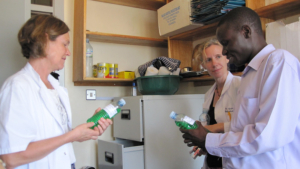Uganda Paves the Way for Palliative Care in Africa
 Palliative care is crucial in mitigating the suffering of individuals who are suffering from serious and/or terminal illnesses. Of the 54 African countries, 43 have no access to basic palliative care systems. Furthermore, even fewer can provide high-quality care to those who need it. Uganda is paving the way for palliative care in Africa. The country is building a nationwide service for citizens to receive care and comfort in the final stages of their lives.
Palliative care is crucial in mitigating the suffering of individuals who are suffering from serious and/or terminal illnesses. Of the 54 African countries, 43 have no access to basic palliative care systems. Furthermore, even fewer can provide high-quality care to those who need it. Uganda is paving the way for palliative care in Africa. The country is building a nationwide service for citizens to receive care and comfort in the final stages of their lives.
Current Situation in Africa
Basic palliative care services are unavailable in 79.6% of Africa. The vast majority of the continent’s seriously ill population is denied specialized assistance that would improve their quality of life. Relieving the suffering and stress from somebody’s final days is widely regarded as the compassionate thing to do, as palliative care supports both a patient and their loved ones through difficult times.
Palliative care, when available, is offered to people with illnesses such as cancer, heart disease, dementia and HIV/AIDS. In 2023, there were approximately 396,200 AIDS-related deaths in Africa. The data suggests that most of these individuals would not have had the appropriate medical care, guidance and comfort in the lead-up to their passing. Similarly, it is estimated that 367,000 Africans get diagnosed with dementia annually; again, it can be implied that few of these people receive palliative care that would provide comfort in a time of confusion.
Furthermore, half a million Africans are believed to die from cancer annually. In the next 50 years, the figure is projected to increase by 40%. Therefore, palliative care services need to be implemented now so that the future is as comfortable as possible for those facing cancer and other serious illnesses.
Uganda Paving the Way
Uganda’s population is currently estimated at 46 million and is growing at a rate of 2.9%. This expanding East African nation is making remarkable progress in palliative care, following a comprehensive framework that supports everyone involved in the medical process: patients, health care staff and their loved ones.
The Palliative Care Association of Uganda
The Palliative Care Association of Uganda (PCAU) is one of the key forces driving this positive change in Uganda. Established in 1999, the organization provides holistic care and pain relief for needy people. With more than 1,500 individual members and 230 medical facilities offering PCAU services, they implement a framework supporting seriously ill patients in Uganda. PCAU has developed a strategic plan with five focus areas:
- Capacity building
- Advocacy and awareness creation
- Palliative care research and information
- Governance and support functions
- Sustainability and financial efficiency
Those affiliated with PCAU work hard to implement these strategies. Indeed, outcomes are being achieved with the support of the Ugandan Ministry of Health, ensuring 55,000 people in Uganda receive palliative care.
Hospice Africa
Another key provider of palliative care in Uganda is Hospice Africa. Founded in the U.K. in 1992, the charity trains health care staff. It provides palliative care across Africa, with a significant focus on Uganda. Its clinical headquarters is in Kampala, where programs are implemented, patients are treated and morphine is manufactured.
Uganda serves as the base for Hospice Africa, which provides much of its medical attention there. Notably, 95% of Ugandan cancer patients do not seek curative treatment, highlighting the demand for holistic care. In 2023, three Hospice Africa Uganda sites cared for 2,110 individuals needing medical attention. Among these new patients, 66% were diagnosed with cancer and 7% were younger than the age of 18.
Hospice Africa Uganda’s reach is growing. The financial year 2022/2023 saw a 12% increase in patients as the charity expanded and received more funding to help care for seriously ill people.
What the Future Holds
Uganda is an African nation leading by example in providing palliative care to its citizens. Furthermore, the country is inspiring the rest of the continent to follow suit. However, there is still much work to be done. In October 2024, the Ugandan Ministry of Health reported that only 11% of the 500,000 Ugandans needing palliative care were receiving it. While more progress is needed in Uganda, the country is setting a positive example with its strategic frameworks to assist those needing end-of-life support.
By 2050, the Ugandan population is expected to exceed 100 million, making it encouraging to see effective frameworks for providing holistic care already in place. The increasing availability of palliative care in Uganda is poised to enhance the quality of life for the country’s growing population.
– Megan Hall
Megan is based in Suffolk, UK and focuses on Global Health and Celebs for The Borgen Project.
Photo: Flickr
